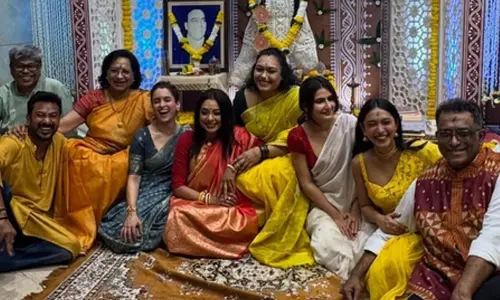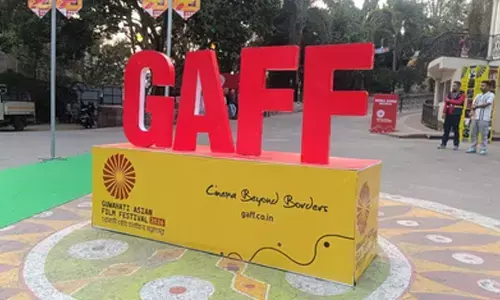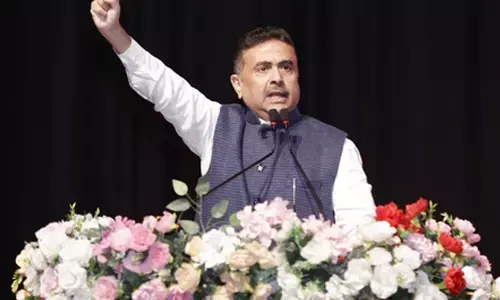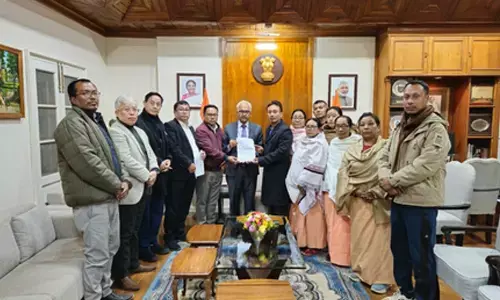Sanatan Dharma a soft target for Cong, its ally
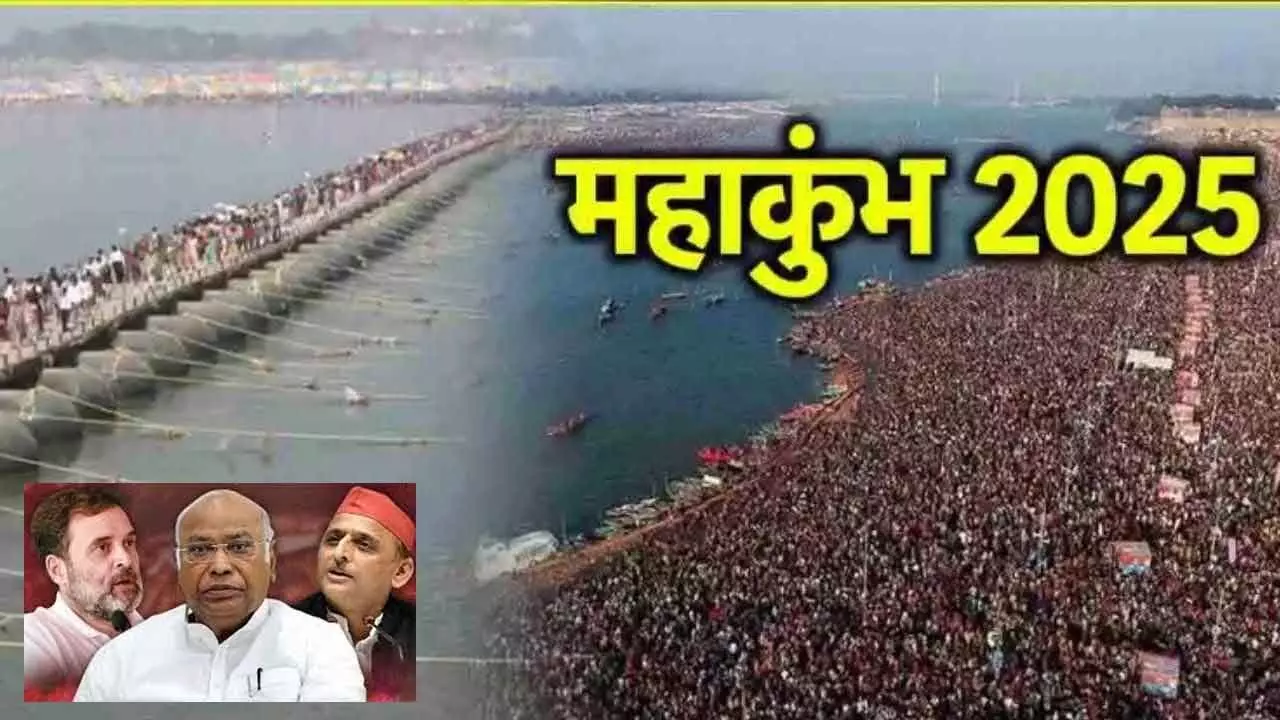
Congress Needs to Follow ‘Ek Bharat, Shreshtha Bharat’ Model – Fatafat Khatakat
One question that perplexes many Indian voters is why Congress and its allies continue to make disparaging remarks about Sanatan Dharma, displaying a lack of understanding and deep-seated prejudice. Their criticism is not random; it reflects an ingrained bias against Hindu traditions. AICC president Mallikarjun Kharge labelled events like Mahakumbh as a waste of money, wondering if a dip in the Ganga can alleviate poverty. Religious events are not meant to eradicate poverty. Samajwadi Party president Akhilesh Yadav went a step further by referring to the Kumbh as a gathering of ‘Chhapri Londe.’ Some leaders have even objected to Prime Minister Narendra Modi taking a dip in the Ganga. Indira Gandhi did the same during the 1977 Kumbh. Senior journalist Tavleen Singh confirms this, adding: “Even Sonia Gandhi took a dip in 2003 during Kumbh.” Did Jawaharlal Nehru make a mistake by personally overseeing the arrangements for Kumbh and dipping his fingers in the Ganga? Did they commit any sin? Kharge and Rahul Gandhi must clarify. Unfortunately, the Congress party — once a grand old institution — seems to have lost not only the support of the people but also its balanced thinking
Every week, there seems to be a fresh attack on Sanatan Dharma, and it appears this trend will not end anytime soon. The latest in this series of narratives comes from nonagenarian leader and AICC president Mallikarjun Kharge, who has labelled events like the Mahakumbh as a waste of money, dismissing the idea that a dip in the Ganga can alleviate poverty. Several pseudo-secular Congress leaders have even suggested that faith should be confined within the four walls of one’s home.
Meanwhile, Samajwadi Party President Akhilesh Yadav went a step further by referring to the Kumbh as a gathering of ‘Chhapri Londe.’ Such language, especially coming from a former Chief Minister of Uttar Pradesh, is not only unbecoming but also crosses the boundaries of decency.
The term ‘Chhapri’ itself carries a deep-rooted casteist undertone. According to internet, historically, when Bijapur was taken over by the Maratha Peshwas in 1720, the Chapparband community was part of their army. They continued serving until the British took control in 1818. Over time, some members of this community turned to (Chaapna) counterfeiting coins, leading the British to label them as criminals and place them in barbed-wire settlements. After independence, many of them resettled in Karnataka and Maharashtra, primarily in Solapur and Pune. Over time, the term ‘Chhapri’ became a derogatory slur to demean individuals as having no standards or credibility.
Some self-proclaimed Congress intellectuals and analysts have even argued that an entire cabinet taking a dip in the Ganga is unconstitutional. It is shameful that in a country with deep-rooted Hindu traditions, Hindus are being told they cannot observe their festivals or rituals publicly.
Unfortunately, the Congress party — once a grand old institution — seems to have lost not only the support of the people but also its balanced thinking. Its ally, the Samajwadi Party, often accused by UP CM Yogi Adityanath of indulging in caste politics, operates on similar lines.
One question that perplexes many Indian voters is why Congress and its allied parties, which selectively target Hindu traditions, do not propose a uniform public policy. If they truly believe religious faith should be confined to private spaces, why not declare that no Hindu festival will be officially celebrated, no Muslim will attend Friday prayers in mosques, no Christian will celebrate Christmas publicly, and no Buddhist festival will be observed? Why should this principle apply selectively to Hindus alone?
No party has the courage to take such a stand. However, Congress and its allies continue to make disparaging remarks about Sanatan Dharma, displaying a lack of understanding and deep-seated prejudice. Their criticism is not random; it reflects an ingrained bias against Hindu traditions. Fluency in English and loud debates on television do not make one a true leader. The statements made by Congress and SP leaders reflect a growing intolerance towards Sanatan Dharma rather than objective political discourse.
Some leaders have even objected to Prime Minister Narendra Modi taking a dip in the Ganga. However, they have no issue when Rahul Gandhi visits a mosque or dargah. If they were to do some research, they would realise that Modi is not the first Prime Minister to take a dip in the Ganga. Indira Gandhi did the same during the 1977 Kumbh. Senior journalist Tavleen Singh has confirmed this, stating, “I know she took a dip. I was there. Indira Gandhi was deeply religious. Even Sonia Gandhi took a dip in 2003 during Kumbh.”
Indira Gandhi also inaugurated the VHP’s ‘Ekatmata Yatra,’ popularly known as the ‘Ganga Jal Yatra,’ in 1983. So, Kharge ji and Rahul Gandhi, what do you have to say now? Can you deny that Indira Gandhi was deeply religious? Do you believe she committed a sin?
Did Jawaharlal Nehru make a mistake by personally overseeing the arrangements for Kumbh and dipping his fingers in the Ganga? Merely calling oneself a Hindu or wearing a ‘Janeu’ (sacred thread) does not make one a true Hindu. Faith is not just about external symbols; it is about inner belief and conviction.
For Congress to revive itself and function as a credible opposition, it must retire leaders above sixty-five and encourage fresh leadership. The party must move beyond its coterie of cheerleaders and adopt a practical, people-centric approach.
Leaders like Kharge should acknowledge that religious festivals — be it Kumbh, Iftar parties, or Christmas celebrations — are not meant to eradicate poverty but serve vital cultural and economic functions. Such events generate immense economic activity, benefiting various sectors at an unprecedented scale.
Rahul Gandhi and other Congress leaders should have at least researched the economic impact of religious festivals before making dismissive remarks. The Mahakumbh, for instance, provides significant financial benefits to a wide spectrum of stakeholders — from milk vendors to helicopter rental companies.
According to Uttar Pradesh’s Industrial Development Minister, Nand Gopal Gupta, Prayagraj is expected to generate over Rs 2 lakh crore in revenue from the Mahakumbh alone. The Confederation of All India Traders (CAIT) projects that the event will generate a staggering Rs 2 trillion in trade.
According to UPSTOX, the 45-day Mahakumbh Mela in 2025 is projected to witness spending amounting to ₹2.5 lakh crore. Market experts suggest that this event could boost India’s GDP by as much as 1%, significantly benefiting travel, hospitality, infrastructure, and numerous other sectors.
The scale of economic activity associated with Mahakumbh is unparalleled. Estimates suggest that local hotels, guesthouses, and temporary lodging will generate Rs 40,000 crore, while packaged foods, water, and meals will contribute Rs 20,000 crore. Items like lamps, idols, incense sticks, and religious books are expected to bring in Rs 20,000 crore, and transportation services like taxis and freight could add Rs 10,000 crore to the economy.
Similarly, local crafts, jewellery, and souvenirs are projected to generate Rs 5,000 crore, while temporary medical camps and Ayurvedic products could contribute Rs 3,000 crore. Even sectors like e-ticketing, digital payments and WiFi services may see business worth Rs 1,000 crore. Such events not only boost the state economy but also significantly contribute to India’s overall GDP.
Congress must realise that casual, dismissive statements alone will not win them votes. The party needs to connect with the people — across all communities — rather than appeasing select groups. Even if they despise Modi, they must acknowledge that the Indian Constitution they so often cite speaks of “We, the People of India.” It envisions a united Bharat. As India enters its 76th year as a Republic, it is high time Congress embraces the spirit of ‘Ek Bharat, Shreshtha Bharat’ rather than viewing it as a BJP-driven slogan. It is not about political color; it is about national unity.










